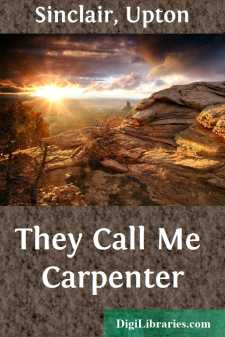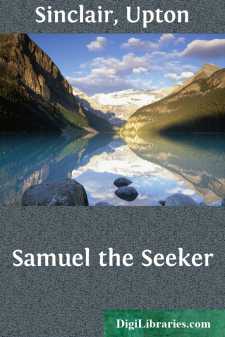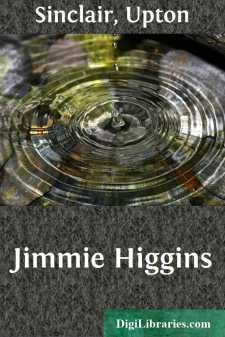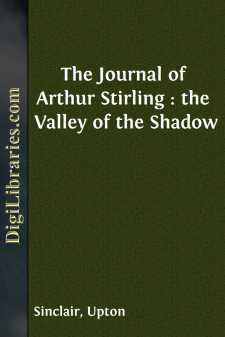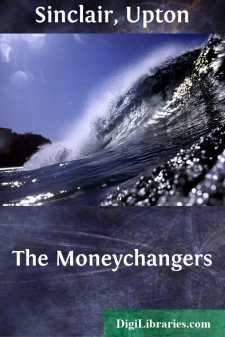Categories
- Antiques & Collectibles 13
- Architecture 36
- Art 48
- Bibles 22
- Biography & Autobiography 813
- Body, Mind & Spirit 142
- Business & Economics 28
- Children's Books 17
- Children's Fiction 14
- Computers 4
- Cooking 94
- Crafts & Hobbies 4
- Drama 346
- Education 46
- Family & Relationships 57
- Fiction 11829
- Games 19
- Gardening 17
- Health & Fitness 34
- History 1377
- House & Home 1
- Humor 147
- Juvenile Fiction 1873
- Juvenile Nonfiction 202
- Language Arts & Disciplines 88
- Law 16
- Literary Collections 686
- Literary Criticism 179
- Mathematics 13
- Medical 41
- Music 40
- Nature 179
- Non-Classifiable 1768
- Performing Arts 7
- Periodicals 1453
- Philosophy 64
- Photography 2
- Poetry 896
- Political Science 203
- Psychology 42
- Reference 154
- Religion 513
- Science 126
- Self-Help 84
- Social Science 81
- Sports & Recreation 34
- Study Aids 3
- Technology & Engineering 59
- Transportation 23
- Travel 463
- True Crime 29
Upton Sinclair
Upton Sinclair (1878-1968) was an American writer and social reformer, best known for his novel "The Jungle," which exposed the harsh conditions and unsanitary practices in the U.S. meatpacking industry. His work prompted public outcry and led to significant reforms in food safety laws, including the Pure Food and Drug Act and the Meat Inspection Act in 1906. Sinclair's prolific career included nearly 100 books, through which he championed social justice, labor rights, and political reform.
Author's Books:
Sort by:
by:
Upton Sinclair
I The beginning of this strange adventure was my going to see a motion picture which had been made in Germany. It was three years after the end of the war, and you'd have thought that the people of Western City would have got over their war-phobias. But apparently they hadn't; anyway, there was a mob to keep anyone from getting into the theatre, and all the other mobs started from that....
more...
by:
Upton Sinclair
CHAPTER I "Samuel," said old Ephraim, "Seek, and ye shall find." He had written these words upon the little picture of Samuel's mother, which hung in that corner of the old attic which served as the boy's bedroom; and so Samuel grew up with the knowledge that he, too, was one of the Seekers. Just what he was to seek, and just how he was to seek it, were matters of...
more...
by:
Upton Sinclair
"Jimmie," said Lizzie, "couldn't we go see the pictures?" And Jimmie set down the saucer of hot coffee which he was in the act of adjusting to his mouth, and stared at his wife. He did not say anything; in three years and a half as a married man he had learned that one does not always say everything that comes into one's mind. But he meditated on the abysses that lie between...
more...
by:
Upton Sinclair
PART I WRITING A POEM The book! The book! This day, Saturday, the sixth day of April, 1901, I begin the book! I have never kept a journal—I have been too busy living; but to-day I begin a journal. I am so built that I can do but one thing at a time. Now that I have begun The Captive, I must be haunted with it all day; when I am not writing it I must be dreaming it, or restless because I am not....
more...
by:
Upton Sinclair
"If chance will have me king, why chance may crown me, Without my stir." Most of the people whom Helen met upon her arrival were of her own sex, so that she did not feel called upon to make special exertions to please them; but she was naturally cheerful and happy with everyone, and the other matters of which Mrs. Roberts had talked took on such vast proportions before her mind that...
more...
by:
Upton Sinclair
BOOK I SYLVIA AS WIFE 1. I am telling the story of Sylvia Castleman. I should prefer to tell it without mention of myself; but it was written in the book of fate that I should be a decisive factor in her life, and so her story pre-supposes mine. I imagine the impatience of a reader, who is promised a heroine out of a romantic and picturesque "society" world, and finds himself beginning with the...
more...
by:
Upton Sinclair
It was in a little woodland glen, with a streamlet tumbling through it. She sat with her back to a snowy birch-tree, gazing into the eddies of a pool below; and he lay beside her, upon the soft, mossy ground, reading out of a book of poems. Images of joy were passing before them; and there came four lines with a picture— "Hard by, a cottage-chimney smokes, From betwixt two aged...
more...
by:
Upton Sinclair
CHAPTER I "I am," said Reggie Mann, "quite beside myself to meet this LucyDupree." "Who told you about her?" asked Allan Montague. "Ollie's been telling everybody about her," said Reggie. "It sounds really wonderful. But I fear he must have exaggerated." "People seem to develop a tendency to exaggeration," said Montague, "when they talk about...
more...
by:
Upton Sinclair
The scenes of the Play-play change with each act. For Act I the set is a drawing-room in a wealthy old New York home, entrances Right-center and Left. Both front and rear scenes are lighted by many small lights, which can be turned off a few at a time, so that one scene or the other fades slowly. When the Real-play is in full light, the Play-play is dark and invisible. When the front scene is entirely...
more...
by:
Upton Sinclair
INTRODUCTORY Bootstrap-lifting Bootstrap-lifting? says the reader. It is a vision I have seen: upon a vast plain, men and women are gathered in dense throngs, crouched in uncomfortable and distressing positions, their fingers hooked in the straps of their boots. They are engaged in lifting themselves; tugging and straining until they grow red in the face, exhausted. The perspiration streams from their...
more...


